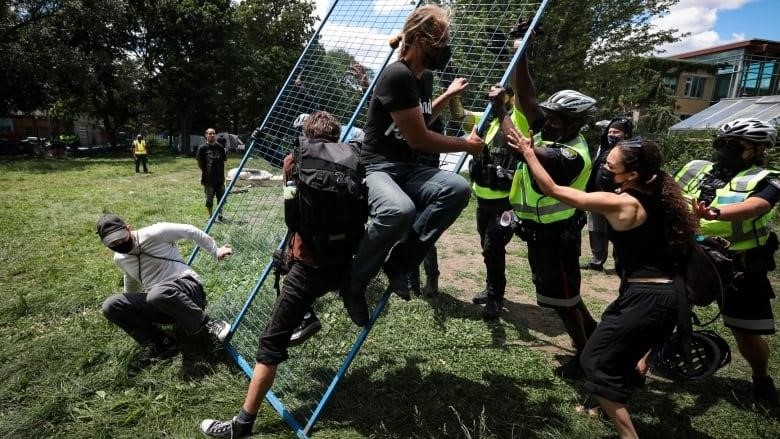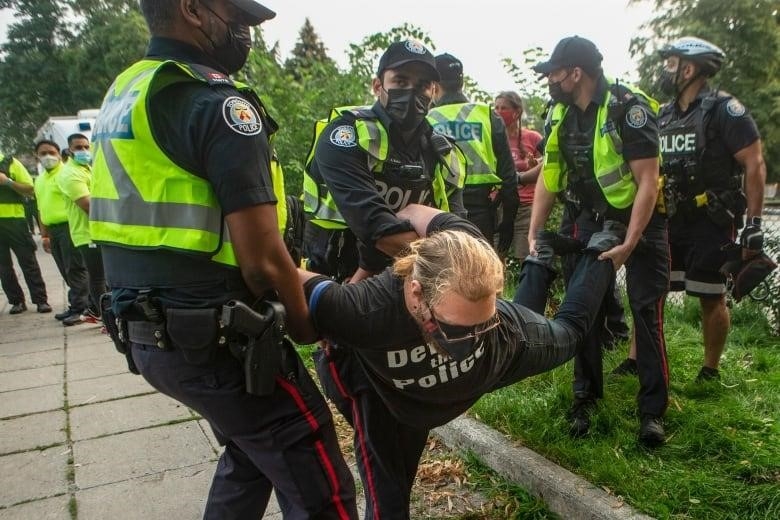
In clearing out three large camps in 2021, the city “chose speed over people.
An investigation into the controversial moves found that Toronto was “significantly unfair” when it cleared out camps in the summer of 2021 and did so quickly, even though there was no immediate need to do so.
In a report released on Friday, Toronto Ombudsman Kwame Addo says the city chose “speed over people” when it cleared out camps in Trinity Bellwoods, Alexandra, and Lamport Stadium parks.
“Our investigation found that the City didn’t care enough about the people it kicked out of the parks,” said Addo.
“It didn’t live up to the promises it made about housing being fair and based on human rights.”
The investigation looked at how the city planned the clearings of encampments, worked with stakeholders, and talked to the public. It found a number of problems, including the fact that the clearings were treated as a “top priority” by the city, even though there was no evidence to show that they needed to be.
Addo found that the city was more interested in getting rid of camps quickly than in helping the people who lived in them. Also, it said that the city knew that the people who lived there had complex mental health needs, but it didn’t have any plans to meet those needs.
“It’s hard to figure out how to help people who live in camps. But the City has a very high duty to treat these people fairly, “he said.
‘Confusing’ communicatio
Addo also found that the city did not engage with the people who lived in them in a meaningful way. Instead, the city sent messages that were “confusing, lacked transparency, and showed a lack of understanding about their reality.”
The report also says that they didn’t have any dedicated staff on-site for people living in the camps to talk to, even though the city knew they had questions that hadn’t been answered.
In an interim report that was released last July, Addo said that the city staff’s way of dealing with homeless people in public parks is out of date and not consistent.
In addition to the eight suggestions made in the interim findings, the report released on Friday has 23 more suggestions.
Among Addo’s suggestions are the following:
- Formalizing the creation of a group of city divisions with a “diverse set of skills and expertise” to lead the response to encampments as a whole.
- If it is decided that the people in the camp need to be moved, their needs will be put first.
- Making a detailed plan for how it will help people living in camps get access to physical and mental health services.
- Making a plan for how to talk to people who live in camps, including plans for Indigenous communities, racialized groups, and groups that need more equity.
Addo says, “Even though my suggestions won’t solve all the problems with encampments, I hope they will make sure that from now on, the City responds to encampments and treats the people who live in them with fairness, transparency, and accountability.”

The city said in a statement that it “accepts the recommendations” of the final report from the ombudsman.
It said, “The City is committed to using a client-centered, people-first approach to help connect people living in encampments with services like shelter and housing.”
At the time of the clearings of camps that were looked at in the review, there were about 370 camps in 58 “greenspace” areas across the city.
“Camping in parks is often a seasonal thing, but as of March 23, there were 75 encampments in 23 City parks.”
The city also said that it is reviewing the ombudsman’s final report “in detail” and that staff will answer questions when the report is presented to council.
